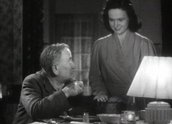
Power to Win (1942)
Synopsis
This is a short wartime documentary directed by Charles Chauvel. It emphasises the contribution of Australia’s coal mining industry to fighting the war in Europe. It includes historical wartime footage, dramatised scenes and documentary segments, with a persuasive commentary by Lou Vernon.
Curator’s notes
Made in mid-1942, Power to Win was the second of four documentaries produced for the Commonwealth Department of Information by Charles and Elsa Chauvel. When he commenced work, Charles Chauvel wrote to the DOI outlining his support for their 'hard–hitting’ film propaganda campaign. Having been determined medically unfit for the army, Chauvel saw this film work as his contribution to the war effort. He ceased feature film production after Forty Thousand Horsemen (1940) to work for the DOI and his next feature, The Rats of Tobruk (1944), builds on his wartime documentary work.
According to Elsa Chauvel, Power to Win was intended as a 'morale builder’ for the miners and, like the other Chauvel documentaries for the DOI, concentrates on the domestic front. During the Second World War, coal shortages were exacerbated by industrial disputes within the mining industry. As coal was needed for gas and steel production, as well as electricity generation, productive coal pits were vital to supplying the war machine with power. Power to Win drives home to the mining industry that the coal pits are the source of the nation’s power in the battle against the enemy.
The opening sequence of graphic newsreel footage of the war in Europe establishes the context and urgency of the situation. Lou Vernon’s emotive narration (written by Chauvel) asks, 'Can we wage a war to equal this?’. A scripted scenario involving a mining family precedes a dramatised meeting between members of the Miners’ Federation and other industry stakeholders. The meeting adopts the slogan 'coal and more coal’ and the miners set to work. The final sequences of workers underground sweating and toiling for the war effort are similar to those in Chauvel’s first film for the DOI, Soldiers without Uniform (c1941). The miners are presented as trying to win the fight as much as their mates in the trenches overseas and Power to Win reminds them that their efforts are not in vain.
- Overview
- Curator’s notes
- Video 1 clip
- Principal credits
- Find a copy
- Make a comment
- Map
- Add your review



